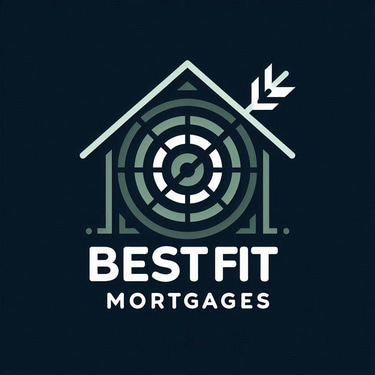The Ultimate Guide to Self-Employed Mortgages in the UK: Tips, Tricks, and Best Practices
Navigating the mortgage process can feel daunting for self-employed individuals, but with the right guidance, securing a mortgage tailored to your needs is achievable. Whether you're a freelancer, contractor, or business owner, this guide will walk you through everything you need to know about getting a mortgage as a self-employed professional in the UK.
Best Fit Mortgages LTD
12/8/20243 min read
On This Page:
What Is a Self-Employed Mortgage?
Common Challenges and How to Overcome Them
Key Documents You’ll Need (Checklist)
Specialist Lenders for Self-Employed Mortgages
Top Tips for Success
FAQs About Self-Employed Mortgages
What Is a Self-Employed Mortgage?
A self-employed mortgage isn’t a special type of loan. It’s a standard mortgage where you must demonstrate your income differently than employed individuals. Lenders assess your income stability, often requiring more comprehensive documentation to prove affordability.
Whether you’re a sole trader, a limited company director, or a partner in a business, your ability to provide accurate financial records is key to securing a deal.
Common Challenges and How to Overcome Them
1. Irregular Income
Unlike salaried employees, self-employed individuals often experience income fluctuations.
Solution: Provide at least 2–3 years of SA302s (or tax calculations) and corresponding tax year overviews to show consistent earnings.
2. Limited Credit History
Many self-employed professionals lack extensive credit history due to irregular borrowing.
Solution: Improve your credit score by:
Ensuring timely payments on all bills.
Registering on the electoral roll.
3. Stringent Lender Requirements
Traditional lenders often have stricter criteria for self-employed applicants.
Solution: Work with a broker experienced in specialist lenders who understand self-employed finances.
Key Documents You’ll Need (Checklist)
To streamline your mortgage application, prepare the following:
SA302 forms for the past 2–3 years (available from HMRC).
Tax year overviews for the corresponding years.
Bank statements (personal and business) for at least six months.
Proof of deposit (e.g., savings account statements).
Company accounts if you’re a limited company director.
Identification and proof of address (e.g., passport, utility bills).
Pro Tip: A mortgage broker can help review these documents before submission to increase your chances of success.
Specialist Lenders for Self-Employed Mortgages
If traditional banks seem unapproachable, specialist lenders can be a game-changer. They cater to unique financial situations and are more flexible with requirements.
Examples of Specialist Lenders:
Precise Mortgages: Known for their understanding of complex income structures.
Kent Reliance: A strong option for contractors or those with adverse credit history.
What Sets Them Apart?
Acceptance of accounts as short as one year, or even less in certain cases.
Consideration of retained profits for limited company directors.
Top Tips for Success
1. Plan Ahead
Start organizing your finances at least six months before applying for a mortgage.
2. Use a Broker
Brokers specializing in self-employed mortgages can connect you with lenders that align with your circumstances.
3. Be Honest About Your Finances
Accurate information builds lender trust and reduces delays in the process.
4. Monitor Your Credit Score
Use tools like Checkmyfile to stay on top of your credit profile and address any errors early.
FAQs About Self-Employed Mortgages
Q: Can I get a mortgage if I’ve been self-employed for less than a year?
A: It’s challenging but possible. Some lenders may consider applicants with strong deposit levels and proof of upcoming income.
Q: Do I need a larger deposit?
A: Not necessarily. While some lenders prefer larger deposits (15% or more), specialist lenders may accept 5-10%.
Q: What if I have bad credit?
A: Specialist lenders often cater to applicants with adverse credit, focusing on affordability rather than credit history alone.
Interactive Tools
Looking to take the first step in your mortgage journey?
Click here to obtain your credit report from all three major credit agencies (Equifax, Experian, and TransUnion). This comprehensive report will help you understand your financial standing and identify any issues before applying for a mortgage.
Why Choose Best Fit Mortgages LTD?
At Best Fit Mortgages, we specialize in helping self-employed individuals secure tailored mortgage solutions. With access to over 180 lenders, we simplify the process and provide clear guidance every step of the way.
Expert Guidance: With a strong focus on self-employed mortgage solutions, we leverage our in-depth knowledge and industry relationships to help you secure the best terms.
Wide Access: Access to over 180 lenders on our panel, including specialist lenders ready to consider complex cases.
Personalized Service: Every client’s financial situation is unique, and we take the time to craft solutions that truly fit your needs.
Ready to Get Started?
Conclusion
Getting a mortgage as a self-employed individual in the UK may have its challenges, but it’s far from impossible. With the right preparation, expert guidance, and a focus on presenting your financial stability, you can secure the mortgage you deserve.
BEST FIT MORTGAGES LTD
T: 01744411604
E: contact@bestfitmortgages.co.uk
Your property may be repossessed if you do not keep up repayments on your mortgage or loans secured on it.
Best Fit Mortgages LTD Registered office address: 60 Chiltern Road, St. Helens, England, WA9 2HT. Registered in England and Wales No: 15722235
Making a complaint: It is our intention to provide you with a high level of customer service at all times. If there is an occasion when we do not meet these standards and you wish to register a complaint, please write to: Compliance Department; Connect IFA Ltd, 39 Station Lane, Hornchurch, RM12 6JL or call: 01708 676110. If you cannot settle your complaint with us, you may be entitled to refer it to the Financial Ombudsman Service www.financial-ombudsman.org.uk
Best Fit Mortgages LTD is an Appointed Representative of Connect IFA Limited 441505 which is Authorised and Regulated by the Financial Conduct Authority and is entered on the Financial Services Register under reference 1017669. The FCA do not regulate some forms of Business Buy to Let Mortgages and Commercial Mortgages to Limited Companies. A fee will be payable for arranging your mortgage. Your consultant will confirm the amount before you choose to proceed, but this is typically 0.5% of the mortgage balance, e.g. £500 for a mortgage of £100000. The guidance and/or advice contained within this website is subject to the UK regulatory regime and is therefore primarily targeted at consumers based in the UK.
© 2024. All rights reserved.
Commission disclosure: We are a credit broker and not a lender. We have access to an extensive range of lenders. Once we have assessed your needs, we will recommend a lender(s) that provides suitable products to meet your personal circumstances and requirements, though you are not obliged to take our advice or recommendation. Whichever lender we introduce you to, we will typically receive commission from them after completion of the transaction. The amount of commission we receive will normally be a fixed percentage of the amount you borrow from the lender. Commission paid to us may vary in amount depending on the lender and product. The lenders we work with pay commission at different rates. However, the amount of commission that we receive from a lender does not have an effect on the amount that you pay to that lender under your credit agreement.
Not all services we offer are covered by the FCA.




